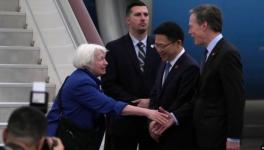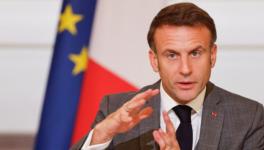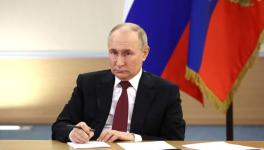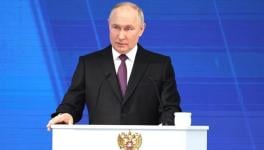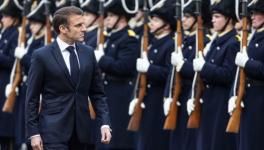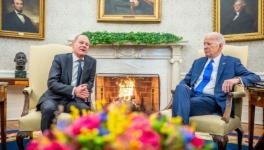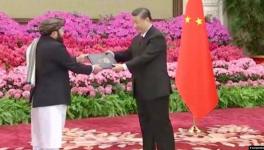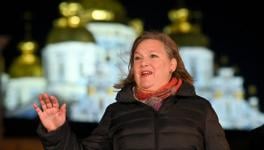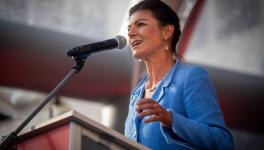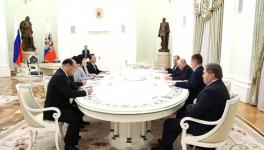Ukraine: The West's Dangerous Gamble
While the western government and its media is trying to build a narrative about Russian intervention in Crimea, what they are hiding is that Yanukovych, a duly elected President of Ukraine, was overthrown in an illegal coup. The street thugs of fascist forces rule the streets; simultaneously, in Kiev, the defense and security apparatus of Ukraine has been handed over to the same fascist forces. The west may believe that using fascist forces to contain Russia is smart geo-strategically, but handing over Ukraine to fascists in the process could create a long term threat to Europe itself; apart from ushering in a new cold war with Russia.
While the western government and its media is trying to build a narrative about Russian intervention in Crimea, what they are hiding is that Yanukovych, a duly elected President of Ukraine, was overthrown in an illegal coup. The street thugs of fascist forces rule the streets; simultaneously, in Kiev, the defense and security apparatus of Ukraine has been handed over to the same fascist forces. The west may believe that using fascist forces to contain Russia is smart geo-strategically, but handing over Ukraine to fascists in the process could create a long term threat to Europe itself; apart from ushering in a new cold war with Russia.
Transcript:
Prabir Purkayastha (PP): Hello and welcome to Newsclick. We have with us today, Professor Aijaz Ahmad, and we'll be discussing the developments in Ukraine, particularly what happened in Kiev- the Euromaidan protests, and then after that what's now happening in Crimea. Aijaz, do you think this is the beginning of another version of the Cold War?
Aijaz Ahmad (AA): I think it's a moment of great intensification in a process of building towards a new Cold War that started very soon after the dissolution of the Soviet Union. In fact, some of the senior people like Kennan and others in the United States, who were great exponents of the First World War, had warned against it by 1993 that 'if you try to expand into the areas which were formerly part of the Warsaw Pact, you'll be initiating a new cold war. Sooner or later the Russians will..' because, just very briefly, what happened at that time is that Gorbachev agreed to dismantle the entire Warsaw Pact structure and let the members of it go even to the West and let them get out of the Socialist Bloc as it was at that time, on the understanding that NATO will not expand at all. Even into East Germany. That even though there might be unification.. in fact it was during the talks over unification that it was understood that even though there might be unification and Warsaw pact troops would leave East Germany, there's a clear understanding that there will be no Western military structures replacing them, and the same was agreed upon about the other countries that were emerging out of former Soviet Union. This began to be reversed actually under Clinton. Since then more and more countries coming out of the of the former Soviet Union certainly in South-Western Europe, have been integrated increasingly into the EU and several of them into the NATO. Some of them have already joined like Poland and Hungary and others, there are others which are expected to join and others have established various kinds of relationships with NATO, so there's been an immense expansion towards the borders. NATO already is on the borders of the Soviet Union in Latvia and Poland in particular. This is the last one and Ukraine is a very big country. It's a very important country, it is in fact the country that joins, it is at the centre of the Eurasian landmass as it were in that part of the world. Not only that, historically Russians trace the origins of their culture to Western Ukraine.
PP: Which is in fact.. Kiev was the heart of the..
AA: Kiev was the heart of where this whole thing arose from the 9th century. This is what their perception is. Ukraine became a part of Russia centuries ago and so on. So there's that whole historic relationship, there's the more recent one and they have been pushing NATO right up to... Moreover, what has happened is that the United States has revised its nuclear doctrine now adopting the idea of a first strike. The kind of advanced positioning of their missile systems and so on, that they are contemplating which will come into Ukraine if they win, will be nuclear capable. So you are back to the position of the old Cold War but right on the borders of Russia, and with a military equation at least which is very much unfavourable to Russia.
PP: So geo-strategically, Ukraine going to NATO is a threat- at least to be seen a such- to the Russians.
AA: It is absolutely a threat. It is a threat of a degree that India- our National Security Advisor- has gone on record saying that Russia has legitimate interests in Ukraine.
PP: And in this Crimea being a particularly important one because Sevastopol is the base in the Black Sea..
AA: It's a Russian base. By treaty obligations Russia has right to keep 25,000 troops in Crimea, which is what is now being called “Russian invasion” of Crimea. I mean this is remarkable. Not a shot has been fired by any Russians, nor have any Russians come in. They have a right to keep 25,000, they have 16,000 there. That's a treaty right.
PP: Which also shows the interests that Russia had particularly in Crimea which in fact is 60% ethnic Russian, and amongst the other sections like the Crimean Tatars who certainly are not Ukrainian in this ethnic concept of Ukraine which is now being presented by the Western Ukrainians.
AA: Yeah yeah. They are actually Turkic. Not only that, people don't realise that a very large number of people who speak Russian as a mother tongue, Russian speaking people, are from Belarus, they are from Poland. They are people who have lived there for generations and generations and a lot of the West Ukraine speaks Russian as their language. There's a Russian language media in Kiev.
PP: Now two things have happened after the fall of the President Yanukovych and we'll come back to how it happened. One is of course that Russian language which had a certain associate status has now been removed from that and though the final decree has not been signed by the Acting President... again a question mark on what is he an Acting President of, but at least supposedly this has not been signed but in practice it's really taking place. The websites have taken off whatever Russian material was there. The second issue is that we're already seeing that Russian language television has also been stopped.
AA: And you see the people who are now virtually dominating the whole thing, which are the neo-nazis, they have a structured position on that. They want what they call a “Ukrainian Ukraine”. Now a milder version of it- Latvia has no neo-nazis in power. There if you're not a Latvian speaking Latvian, you only halve an alien passport. You do not have a citizenship of Latvia if you do not some very stringent language tests. This business of... Linguistic fascism is what I call it. It happened in Croatia, Serbia and Latvia. In Latvia it has happened to the Russians and in Latvia about 45% of the population speaks Russian. It has already happened. So people in that part of Ukraine are frightened as to what is going to happen to them. They're going to become second class citizens even linguistically and culturally. The next two generations won't be able to get jobs and so on.
PP: You talked about the fascists in power. Officially of course this is Yulia Tymoshenko's party which is leading the so-called Kiev Government on the Kiev dispensation and the seven ministers from Svoboda and Pravyi Sektor, the two fascist formations, both of which trace their lineage to- as you said- the Ukrainian “ethnic nationalism” of Stepan Banderas. Now this is the current dispensation which seems to be heavily weighed in favour of the fascists because they hold the guns.
AA: I think calling them nationalists is a device of Western propaganda. There are extensive evidence of what their beliefs are. As of 2010 the party's website is so anti-semitic. As of 2005 they had a research centre named after Goebbels. So calling them right-wing nationalists is whitewashing them. Leading members of these groups have been banned in the United States very recently.
PP: As late as 2013, and that's Tyahnibok who's now, I think, the Deputy Prime Minister of the Kiev regime.
AA: That's right. Banned last year. European Parliament has a resolution passed when these people entered Parliament.
PP: Yes. Against Svoboda.
AA: Now they are not just members of Cabinet. If you look at it the Defence Ministry and the National Security establishment is exclusively in their hands, which is what they want. You can take agriculture or whatever, industry- there's hardly any industry in West Ukraine anyway so you take industry. All of the establishment is with them. Not only that, they have banned the communist party which took 13% of the vote in the last elections. If they also either lose Crimea territorially or do the kind of things that they are doing, polls suggest that the combination of the three fascist groupings – Common Cause, Pravyi Sektor and Svoboda- will win a majority. They can form government through the next parliamentary elections if the communists and the Crimean opposition is disenfranchised. So you're as close to it as that.
PP: But do you think that the Eastern part of Ukraine and the Southern part of Ukraine which has been very much anti Ukrainian “ethnic nationalism” or fascism if you will... do you think that that section is not going to vote against them?
AA: I was talking about either their disenfranchisement or their actually leaving the Union, which is quite possible. So if there is anything preventing them from coming to power, it will be the vote from that area.
PP: East and Southern part of Ukraine, but at the moment the other part of it is that the Ukrainian existing security establishment at least in Western Ukraine, Kiev, has been dismantled. There isn't anything left over there which they can even call to arms even to fight the Russians as they want to do, but then they are going to raise 20,000 militia, essentially, which are as you said, with the security establishment in the hands of the fascists which means it's really going to be the stormtroopers of these who were the ones leading the Euromaidan protests, as you know. So do you think that under such conditions any vote is meaningful?
AA: Under such conditions we already have the experience that they remove a President, completely unconstitutionally. Their party had a majority in the Parliament. They are silenced through such terror- the parliamentarians from that political party- that their parliament immediately starts passing all kinds of... and nothing happens because we have already seen what can be accomplished by that terror. How did this military onslaught on the state in Syria begin? With how many people? You build it up. One other point that I would like to make is that this is not the first time that they have used fascists in this reorganisation of the former socialist countries. They did it in Slovenia and Croatia at the very beginning of it.
PP: Yes. The Ustase flag virtually was..
AA: I was sitting in a restaurant in Slovenia in 1994 when the owner came and told us to leave right away, don't pay. Why? He was going to close the restaurant, and why? Because the Foreign Minister and his entourage was on its way to come and eat there and they were fascists and this man was not going to serve them food. It was like that in these countries which were taken over by “democracy”.
PP: All this also means that if Ukraine is to be taken over by the West, which is what the game plan is, they'll also have to bankroll a bankrupt Ukraine. They'll have to really take over the huge debts that Ukraine has. It also means that if the relations with Russia become strained, as it is increasingly threatening to become, then the gas supplies of Western Europe comes through Ukraine. So do you think this is a complete NATO overreach, Western overreach and that this is really going to boomerang on them?
AA: There's a very good possibility of it. However, if the Western finance capital- which has enormous amounts of surplus money- really decides that it is worth the geo-political gain, they'll go for it. That's my view. The way in which Europe is rolling over, Britain is saying 'we'll impose financial sanctions on Russia but not on those Russians who're living in Britain and have money in our banks. All the oligarchs, right.
PP: Who buy football clubs in Britain!
AA: That's right. Merkel's favourite candidate for the Presidency lives in Germany.
PP: And pays taxes there.
AA: And pays taxes there.
PP: Klitschko, Vitali Klitschko.
AA: So you can play this in all kinds of ways. Is it worth the geo-political gain? It's extraordinary how EU... it's not only Ukraine, about half of its gas comes from Russia and it cannot come from anywhere else, but EU, Germany all of them get an enormous amount of it. European companies have enormous investments- 9 billion or so- in Russia, and are they going to sacrifice all of that? Russia is a rising economic power. You can play your financial games and push the Rouble's value down now but with a threat of a real war in Europe? Where do the prices of gas and oil go? So it's a very very serious moment because if this is what they do to Russia, what happens to their Asian pivot? And what happens to Chinese neutrality between the United States and Russia, in the long run?
PP: So this is really a new chapter of political changes, particularly between Russia and NATO, the US and the EU as a bloc. It's interesting that US is really asking EU to bankroll what's going to happen in Ukraine. Interestingly enough that not having bailed out Greece and Spain, if they bail Ukraine out in this fashion it's not going to be easy for its domestic politics as well. So this really a completely new Europe that we're looking at.
AA: Sure, absolutely. This is a Pandora's Box. Americans did not understand what they were getting into when they congregated a hundred thousand jihadis in Afghanistan in order to contain the Soviet Union, and Brzezinski to this day does not concede that it was a historic error on their part to have done so. They start playing the same kind of game...
PP: With fascism in the heart of Europe.
AA: With fascism in the heart of Europe, at the time when fascism is rising in so many other European countries.
PP: Including France.
AA: Including France, Austria. In Greece there are 18 MPs today, god knows what will happen in the next elections and so on. You give them state power in one country and a major country.
PP: And Ukraine is not a small country..
AA: You give them power and how much will it inspire the fascists in other countries? How much will it legitimise fascism as an honourable partner in the political future of Europe?
PP: So this is really the decisive moment in European history as Afghanistan was for West Asia and..
AA: Could well be if they don't step back.
PP: There are other issues. The Afghanistan effect in West Asia, South Asia, it affected even South-East Asian countries like Indonesia and Malaysia, North Africa.. but it really didn't affect the United States, but here what happens is going to affect Europe. Now that may not also affect US in the same way but EU is not exactly something that they can...
AA: Yes. I mean it did not affect the United States in terms of change in power equations in the country but the dismantling of the constitutional state- the United States, huge financial costs that they bore. They've not been able to extricate themselves from that quagmire and they're actually getting deeper and deeper into it because it is a logic. You either get out of it altogether and concede defeat or you keep going deeper and deeper into it. If alongside that.. and as you quite rightly said this is happening on European territory.
PP: People who are “like them”, if you will. Not those Brown and other colours.
AA: Absolutely. The special thing of the Jewish Holocaust is that it happened in Europe to Europeans. European history has not been able to recover from that trauma. Now what happens?
PP: Last question- and this is something of course on which we will need to have a deeper discussion some other time but just for your reference and your opinion- while it shows that the American imperialism was weakened, that it's not able to control past territories, seize them and make them as they want, but their military ability to break up countries, the strength of imperialism to actually destroy other countries has actually grown. So you have this square mixture of weakness on one side as you said, the quagmire that you were talking about, economically and other ways, but also much greater striking power against other countries. People have been having the sort of simple dichotomy of weakening imperialism or strengthening imperialism, it seems to be doing simultaneously, both.
AA: You're quite right. I think this very structural feature of a declining economy, great economic weakness but an exaggerated military strength creates a situation in which the entire establishment, not just neo-conservatives, liberals and everybody wants military solutions to everything because that's the power they have.
PP: Interesting. We must really come back and discuss this one day. This is an interesting dichotomy we're seeing in the heart of imperialism. Weakening on one side and strengthening on the other. People have been looking at partially one or the other an not both together. I think that's something that Ukraine is also going to bring out.
AA: Well, the referendum is coming up so we'll have to have another discussion on Ukraine early next week. At that time again maybe we can bring this up, this whole question of the imbalance between military and economic power of the great imperial centre.
PP: Thanks Aijaz. Good to have you with us and we will, as you said, come back and discuss the Crimean referendum which is now in the offing this Sunday. Thank you very much.
AA: Thank you.
Get the latest reports & analysis with people's perspective on Protests, movements & deep analytical videos, discussions of the current affairs in your Telegram app. Subscribe to NewsClick's Telegram channel & get Real-Time updates on stories, as they get published on our website.









